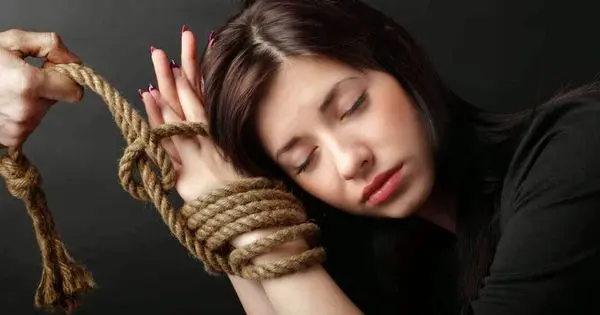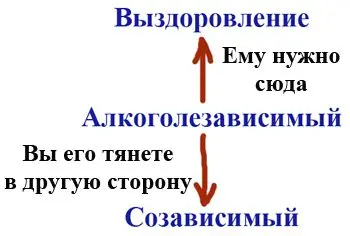Contents
😉 Greetings to regular and new readers! The article “What is codependency from an alcoholic and what should be done” provides detailed information on what codependency is. Psychologist’s advice on how to get rid of this serious problem. Related videos.
What is codependency?
Codependency is a painful, at the level of mania, a pathological condition that is characterized by strong emotional, social and physical dependence on a loved one. This term is most often used in relation to relatives and friends of alcoholics, drug addicts and people with any other addictions.
A codependent person does not try to get rid of the negative influence of a partner. He does not make real, effective attempts to change the situation for the better (sometimes subconsciously). In social psychology, the Karpman Triangle model is known, describing the roles of codependent people.
Alcoholic codependency
Alcoholism is a terrible disease. And if not among our loved ones, then in the immediate environment we will definitely find someone who suffers from this disease. As we age, we can compile our own tragic list of mutilated destinies, destroyed families, lost lives.
But relatives of alcoholics are also sick. They are codependent. According to research, it has been established that one alcoholic can provoke a state of codependency in 10 people from his immediate environment. But the wives of alcoholics suffer the most.
A woman whose husband is sick with alcoholism is deeply unhappy. This misfortune deprives her of peace, family happiness, material well-being, and cripples her psyche. Such a woman experiences constant nervous tension, she is haunted by a feeling of shame, guilt, despair.
Often she resigns herself to the state of affairs for the sake of children who continue to love their father and do not always understand the state of the mother. But still she lives only with the dream of breaking out of the circle of circumstances that force her to endure all this.
Constant tension is looking for its way out, more and more often a woman breaks down and makes scandals that do not change anything for the better. And what an outrage her senses feel! After all, this is a real tragedy – to observe the gradual fall and degradation of the husband, to endure insults and bullying from him.
The woman is torn apart by contradictions, she is emotionally unstable: her feelings range from sympathy to irritation, from hope to despair, from love to hate.
Sometimes a loving woman, in order to keep her husband in the family, begins to drink with him. This is a terrible path – after all, alcoholism in women develops much faster.

But even if an alcoholic woman does not drink alcohol at all, she is also sick. Psychologists regard the loved ones of those who drink as codependent on alcohol, and at subsequent stages as alcoholics. And the first step to mental health is to become aware of your illness.
According to research data, only 24% of wives understand that her husband’s alcoholism is directly related to her attitude to the situation, and that she can help her husband only by drastically changing her behavior. Now you understand what alcoholic codependency is. What to do next?
Signs of codependency
First of all, it is important to acknowledge the fact of your illness. You are codependent on an alcoholic if:
- don’t worry about the amount of alcohol he drinks;
- have financial problems related to his drinking;
- worried about his late return home;
- feel ashamed because he drinks, hide his illness from others;
- you feel guilty for various reasons: it seems to you that he drinks because of you, that you cannot save him, that you did not leave him in time, did not protect children, help him overcome problems associated with drinking;
- are convinced that it is not he who is guilty of drinking, but friends, colleagues, relatives … or, for example, circumstances, hard life, nature of work;
- have contemplated suicide;
- resorting to threats of divorce;
- always trying to determine the fact of alcohol consumption and assess the degree of intoxication;
- looking for hidden liquor;
- convinced that he can quit drinking on his own if he really wants to;
- avoid irritating moments in communication;
- refuse home holidays or invitations;
- you feel unhappy, you are convinced that it was the alcoholism of a loved one that ruined your life;
- limit communication with friends and colleagues;
- take out anger at someone else, although in reality you are annoyed because of his behavior;
- convinced that those around you do not understand the full extent of your suffering due to living with an alcoholic.

The husband is an alcoholic: what to do
Don’t let the illusion that your husband will drink less or quit altogether. Alcoholism is a disease in which self-control is disturbed in the first place. Hope for the best, but build your life around the fact that you are living with an alcoholic.
Don’t try to overcome your husband’s drinking problems on your own. Look for treatment centers, specialists, unfortunate girlfriends, support groups.
Realize that you will have to be treated at the same time: your husband – from alcoholism, and you – from codependency. If you fail to drastically change your behavior, he will never recover.
Do not hide your husband’s drunkenness from others. Calmly explain to everyone that he is a patient with alcoholism. Do the same if your husband was sick with any other disease.
Do not even admit that it is you who are guilty of your husband’s drinking (this is one of the favorite excuses for drinking). Do not try to find the origins of his addiction to alcohol.
Remember that the reason is not in family troubles, not in problems at work, not in bad company, but in your husband’s painful attraction to alcohol.
Analyze your life. Think over and write down the pros and cons of your cohabitation with an alcoholic. And whichever option you choose – to leave the alcoholic or continue to live with him – this is your decision.
Therefore, calmly take all the problems associated with it: you are no longer a victim, but a person who made a conscious choice.

Change your attitude towards your husband
Do not scare your husband with divorce – he is unlikely to believe. If life next to an alcoholic has become unbearable or you hope that this will stop him, put the question point-blank: “Either I, or the bottle.” But only on condition that you are really ready to break up.
If your husband once again promises to quit drinking, keep your collected things ready to leave at the first breakdown.
Change your attitude towards your husband. “Let go” him, shift the responsibility for his own destiny onto him. Give him the opportunity to be responsible for his own actions. Watch him calmly, like a stranger (for example, a neighbor). Do not try to control him, artificially restrain him from drinking, scold him.
Never clean up after him if he has done something while intoxicated. Let him see the consequences of his behavior the next day. Do not pay off his debts, do not cover up in front of his superiors, colleagues, friends, neighbors. “Get out of the game,” leave him alone with your illness.
Avoid quarrels, especially if you have children: their psyche is more destroyed by your painful reaction than the behavior of the father.
Do not artificially restrain the moment when the crisis comes. Give your husband the opportunity to “push off the bottom.” A crisis is a turning point when he will either die or be saved. It is at the moment of crisis that the patient can consciously go for treatment or simply stop drinking.
Your task is not to die with your husband. You can save a drowning man only on condition that you yourself get to the shore.
Analyze your life. Frankly admit to yourself what you have become addicted to your husband’s alcoholism, from which you have given up. Think about what you could change. Step by step, fight for your right to a normal life. Everyone has one life!

Start living!
Go on a visit without your husband, be somewhere with your children, take care of yourself. Look for girlfriends and acquaintances with whom you could take your mind off the harsh home experiences. Allow yourself to enjoy life. If you are financially dependent on your husband, look for ways out of this situation.
Think about how you will live when your husband stops drinking. What will your life be filled with? Will you feel empty, will you have enough adrenaline and vivid (though not too pleasant) sensations?
The really big threat is when an alcoholic actually quits drinking, and other family members subconsciously oppose it.
Self-help groups
Be prepared for long-term work with a psychologist. Look for self-help groups for relatives of alcoholics, called Al-Anon, which are known around the world in the same way as AA (Alcoholics Anonymous) groups. These groups have proven their effectiveness over many decades.
Members of Al-Anon follow the thesis that alcoholism is a family disease, and a change in attitude towards an alcoholic can contribute to recovery. The shame, despair and fear that codependent people constantly feel can be overcome if it is “brought out”, expressed in a circle of people who will understand you.
Some advice may seem, at first glance, unacceptable and harsh, but they are the result of many years of work by specialists and self-help groups. This has already been proven: you can only help an alcoholic by recognizing your codependency and drastically changing your behavior. You can only recover together.
A selection of videos “What is alcoholic codependency” – additional information to the article
In this video, useful tips from a psychologist → What is codependency from an alcoholic and what to do ↓
Dear readers, leave your comments on this topical topic “What is alcoholic codependency and what should be done”. Share this information with other people on the networks. Perhaps someone is at an impasse now …










Mă sperie ce spui aici… concluzia e că-i lăsăm cu băutura şi ne vedem de viață!
Dar ce facem când încă îl iubim pe alcoolic😪🤔?